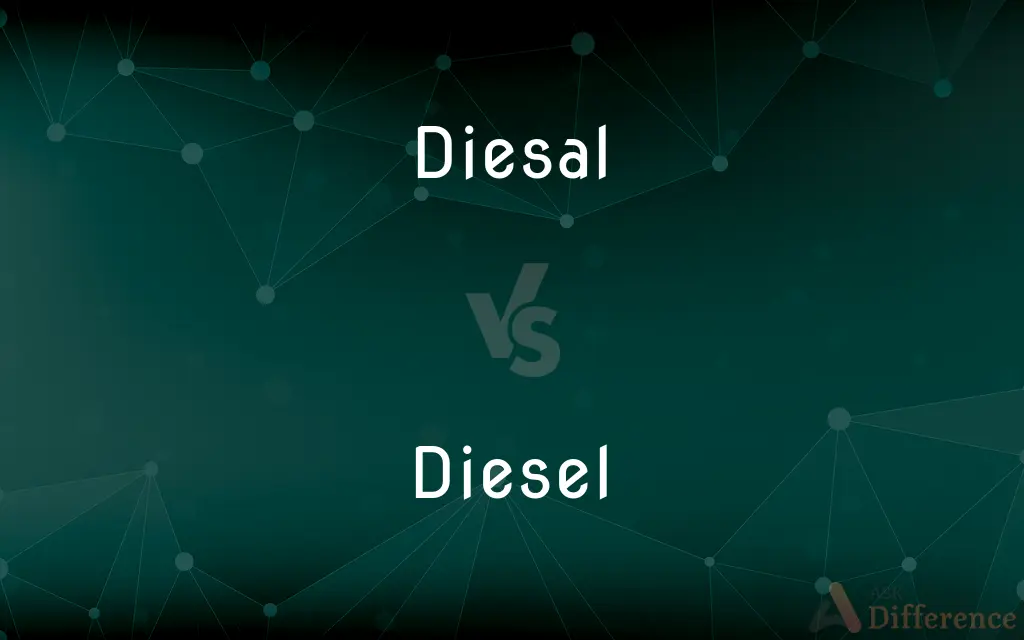Diesal vs. Diesel — Which is Correct Spelling?
Edited by Tayyaba Rehman — By Fiza Rafique — Updated on March 29, 2024
"Diesal" is an incorrect spelling. The correct spelling is "diesel," a type of fuel or engine.

Table of Contents
Which is correct: Diesal or Diesel
How to spell Diesel?

Diesal
Incorrect Spelling

Diesel
Correct Spelling
ADVERTISEMENT
Key Differences
Remember "i before e" in "diesel."
Associate the word "diesel" with vehicles that use this fuel.
Think of "diesel" as being related to "fuel," both end in "el."
Visualize a diesel pump at a gas station.
Compare with the famous inventor "Rudolf Diesel."
ADVERTISEMENT
How Do You Spell Diesel Correctly?
Incorrect: We bought a diesal generator for emergencies.
Correct: We bought a diesel generator for emergencies.
Incorrect: The smell of diesal is strong at the pump.
Correct: The smell of diesel is strong at the pump.
Incorrect: The diesal engine is very efficient.
Correct: The diesel engine is very efficient.
Incorrect: Can diesal fuel freeze in extreme cold?
Correct: Can diesel fuel freeze in extreme cold?
Incorrect: He filled his truck with diesal.
Correct: He filled his truck with diesel.
Diesel Definitions
Relating to engines that burn diesel fuel.
Diesel engines are known for their durability.
A heavy petroleum fraction used as fuel.
Trucks often run on diesel fuel.
A fuel derived from crude oil distillation.
Diesel is cost-effective for long journeys.
A diesel engine.
A vehicle powered by a diesel engine.
Any of various fuels used to power diesel engines, especially one derived from petroleum.
To continue running after the ignition has been turned off, as when an open throttle supplies fuel to an engine that is still sufficiently hot to ignite it.
To drive a diesel-powered vehicle
We dieseled through the countryside.
To refuel a diesel-powered vehicle. Often used with up.
A fuel derived from petroleum (or other oils) but heavier than gasoline/petrol. Used to power diesel engines which burn this fuel using the heat produced when air is compressed.
(countable) A vehicle powered by a diesel engine.
A rider who has an even energy output, without bursts of speed.
Snakebite and black (a drink).
(slang) A particular cannabis hybrid.
To ignite a substance by using the heat generated by compression.
(automotive) For a spark-ignition internal combustion engine to continue running after the electrical current to the spark plugs has been turned off. This occurs when there's enough heat in the combustion chamber to ignite the air and fuel mixture without a spark, the same way that heat and pressure cause ignition in a diesel engine.
A type of internal-combustion engine in which the air drawn in by the suction stroke is so highly compressed that the heat generated ignites the fuel (usually a heavy oil), the fuel being automatically sprayed into the cylinder under pressure. The Diesel engine has a very high thermal efficiency.
German engineer (born in France) who invented the diesel engine (1858-1913)
An internal-combustion engine that burns heavy oil
An internal combustion engine running on such fuel.
He drives a diesel truck.
Characterized by the ignition of fuel from compressed air.
The diesel mechanism doesn't require spark plugs.
Diesel Meaning in a Sentence
He prefers diesel vehicles for their fuel efficiency.
Diesel engines don't use spark plugs.
Diesel cars can be more economical on long journeys.
Diesel engines are common in heavy machinery.
Many trains are powered by diesel engines.
The smell of diesel reminds me of the bus station.
His boat has a small diesel engine.
Diesel engines are known for their durability.
The truck runs on diesel, not gasoline.
They stopped at the station to get diesel.
Diesel fuel prices vary from place to place.
Diesel fuel is used in some types of farming equipment.
The new diesel model offers improved performance.
The diesel locomotive pulled the train effortlessly.
The diesel generator provides backup power.
He's looking into the advantages of diesel heating systems.
She learned to drive in a diesel truck.
The company is developing a more efficient diesel engine.
The mechanic specializes in diesel engines.
There's a diesel spill on the road.
She bought a diesel-powered heater for the cold nights.
Diesel exhaust fumes can be harmful if inhaled.
Diesel engines are different from petrol engines in several ways.
Many fishermen use diesel engines in their boats.
Diesel Idioms & Phrases
Like a diesel
Takes a while to get going but then performs steadily.
He's like a diesel in the morning; slow to start but unstoppable once he's up.
Diesel power
Refers to something or someone that has endurance and reliability.
Even at the end of the marathon, she was still going strong, a real example of diesel power.
Diesel-hearted
Describes someone very resilient and tough.
After all he's been through, he's truly diesel-hearted.
Common Curiosities
Why is it called diesel?
It's named after Rudolf Diesel, the inventor of the diesel engine.
What is the verb form of diesel?
There isn't a commonly accepted verb form, but "diesel" is sometimes used informally as a verb meaning to run or operate on diesel fuel.
What is the pronunciation of diesel?
/ˈdiːzəl/
What is the plural form of diesel?
Diesels.
What is the singular form of diesel?
Diesel.
Which preposition is used with diesel?
"On" as in "running on diesel."
Which conjunction is used with diesel?
No specific conjunction is predominantly associated with "diesel."
What is the root word of diesel?
The name "Diesel" from Rudolf Diesel.
Which vowel is used before diesel?
The letter 'e' is used before the "-sel" in "diesel."
Is diesel an adverb?
No.
Is diesel a noun or adjective?
Diesel can function as both a noun and an adjective.
Is diesel a collective noun?
No.
Is diesel a vowel or consonant?
"Diesel" is a word containing both vowels and consonants.
Is the word diesel imperative?
No.
How many syllables are in diesel?
Two syllables.
What part of speech is diesel?
It can be a noun or an adjective.
What is the opposite of diesel?
Given its varied meanings, there isn't a direct opposite. However, in the context of fuel types, "gasoline" can be contrasted with "diesel."
Is diesel a negative or positive word?
Neutral; it describes a type of fuel or engine.
Is diesel a countable noun?
Yes, when referring to types or engines, e.g., "There are several diesels to choose from."
Is the diesel term a metaphor?
Not inherently, but it can be used metaphorically.
How do we divide diesel into syllables?
Die-sel.
Which determiner is used with diesel?
Determiners like "this," "that," "my," or "the" can be used with diesel.
Which article is used with diesel?
Both "a" and "the" can be used, depending on the context.
Is diesel an abstract noun?
No, it's concrete.
What is a stressed syllable in diesel?
The first syllable, "die."
What is another term for diesel?
Diesel fuel or diesel engine.
What is the first form of diesel?
Diesel.
What is the second form of diesel?
There isn't a distinct second form for "diesel."
What is the third form of diesel?
There isn't a distinct third form for "diesel."
How is diesel used in a sentence?
"Many trucks use diesel fuel because of its efficiency on long trips."
Share Your Discovery

Previous Comparison
Gyst vs. Gist
Next Comparison
Perserverence vs. PerseveranceAuthor Spotlight
Written by
Fiza RafiqueFiza Rafique is a skilled content writer at AskDifference.com, where she meticulously refines and enhances written pieces. Drawing from her vast editorial expertise, Fiza ensures clarity, accuracy, and precision in every article. Passionate about language, she continually seeks to elevate the quality of content for readers worldwide.
Edited by
Tayyaba RehmanTayyaba Rehman is a distinguished writer, currently serving as a primary contributor to askdifference.com. As a researcher in semantics and etymology, Tayyaba's passion for the complexity of languages and their distinctions has found a perfect home on the platform. Tayyaba delves into the intricacies of language, distinguishing between commonly confused words and phrases, thereby providing clarity for readers worldwide.


































